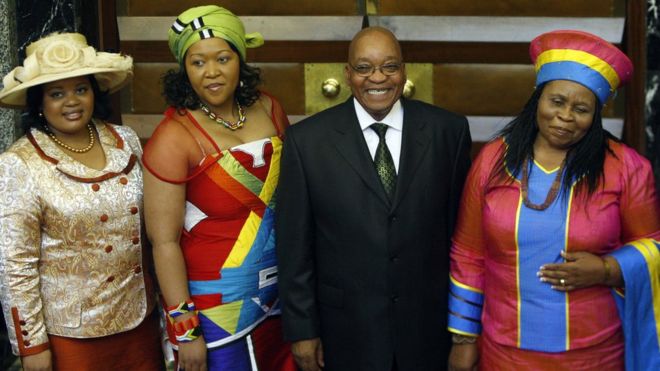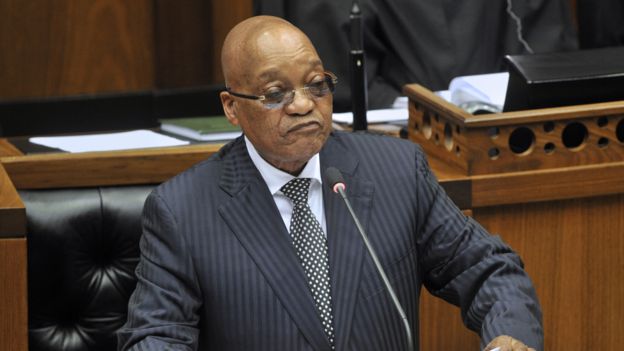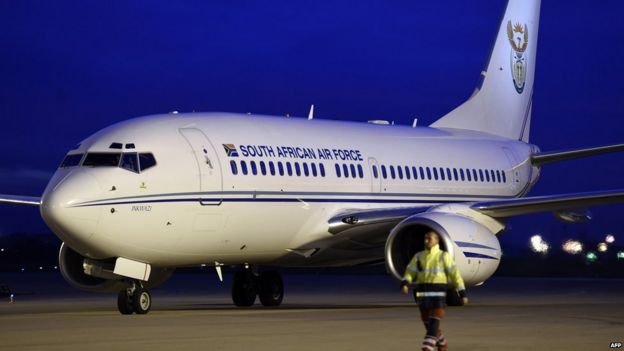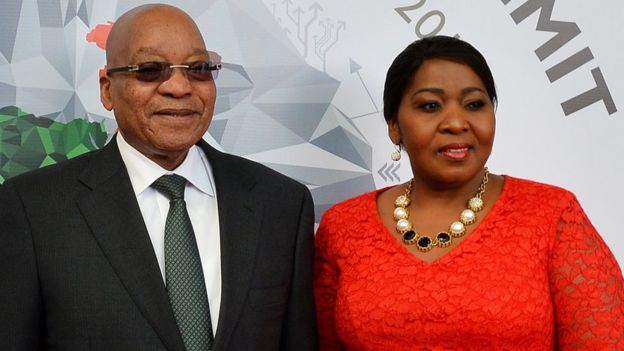- 9 hours ago
- Africa
 AFP
AFP
South Africans are wondering how serious President Jacob Zuma is about austerity after it emerged this week that the state had spent about 8.6m rand ($550,000; £374,000) on new cars for his wives over the past three years.
In response to a parliamentary question from the opposition this week, Police Minister Nathi Nhleko said the police had spent close to $230,000 alone on luxury cars for President Zuma's four wives this year - despite a call for citizens to tighten their belts as South Africa's economy struggles to meet growth targets.
He said a total 11 vehicles for Mr Zuma's wives had been purchased out of the police budget:
- Four Range Rovers bought in 2013 for $60,000 each
- Two Land Rover Discovery worth $40,000 each bought in 2014
- Two Audi Q7s bought in March this year for $40,000
- And three Audi A6s also bought in March this year for $50,000 each.
Mr Nhleko, who is known for putting his head on the block for Mr Zuma, justified the purchases saying they were there "to provide comprehensive protection of VIP spouses".
Necessity or wasteful spending?
It wasn't that long ago when I watched the finance minister Pravin Gordhan announce austerity measures in parliament.
"This year's Budget, Honourable Speaker, is focused on fiscal consolidation. We cannot spend money we do not have. We cannot borrow beyond our ability to repay," Minster Gordhan said passionately while delivering his 2016 budget speech on 24 February.
After listing a whole number of cost reduction measures, including guidelines limiting the value of vehicles, for office bearers, he said: "Until we can ignite growth and generate more revenue, we have to be tough on ourselves."
Concluding his speech, he even thanked the president for his "support." A statement tinged with irony now.
He did not, however, specify the limit he wanted to impose for car purchases.
The controversy around President Zuma's inconsistencies is not only limited to spousal budgets and their luxury cars.
 RODGER BOSCH
RODGER BOSCH
Defence Minister Nosiviwe Mapisa-Nqakula vowed to go ahead with a purchase of a presidential jet believed to cost about $2.5m.
"There is no way we can avoid this because in the first instance, we must ensure the principal is safe," she said emphatically in parliament on Wednesday.
The minister stressed that the acquisition of aircraft for the president and deputy president was urgent because the presidential jet, South Africa's equivalent of Air Force One known as Inkwazi, and the plane transporting Deputy President Cyril Ramaphosa have experienced technical problems several times.
Replying to howls of disdain from opposition parties at the news of the purchase, she retorted:
"I'm sure your former president before democracy used to fly SAA," she snapped back at the main opposition Democratic Alliance (DA), a historically white party.
 AFP
AFP
According to the DA, the money used to buy the presidential wives' cars could have instead be used to fund:
- 116 university students for a year
- 38 students studying for a three-year degree
- An additional 61 police officers for a year.
"Yet the president decided to spend this gigantic amount on lavish VIP vehicles for his wives," said DA MP Zakhele Mbhele, who had initially asked the question about the controversial expenditure.
Mbuyiseni Ndlozi from the Economic Freedom Fighters said President Zuma was using the country's treasury "as his personal purse".
Mrs Zuma:
 AFP
AFP- Bongi Ngema - married April, 2012
- Thobeka Madiba - married January 2010
- Nompumelelo Ntuli - married January 2008
- Sizakele Khumalo - married 1973
- Home Affairs Minister Nkosazana Dlamini-Zuma - divorced 1998
- Kate Mantsho - died 2000
But who is to blame for all of this?
Tinyiko Maluleke, a political analyst from the University of Pretoria says that South Africans should look at themselves for the answer.
"When you vote for a president who is a polygamist, you must have factored that into the arrangement," he told the BBC.
In South Africa, polygamy is a protected traditional right within the constitution for communities who practise the custom.
So this isn't a debate about the president's right to marry more than one wife but rather the merits of his family's maintenance costs by the state.
While no rule was broken, surely someone should have thought about the wider implications of this purchase at a time when the government was asking the rest of the country to tighten its belt?

No comments:
Post a Comment